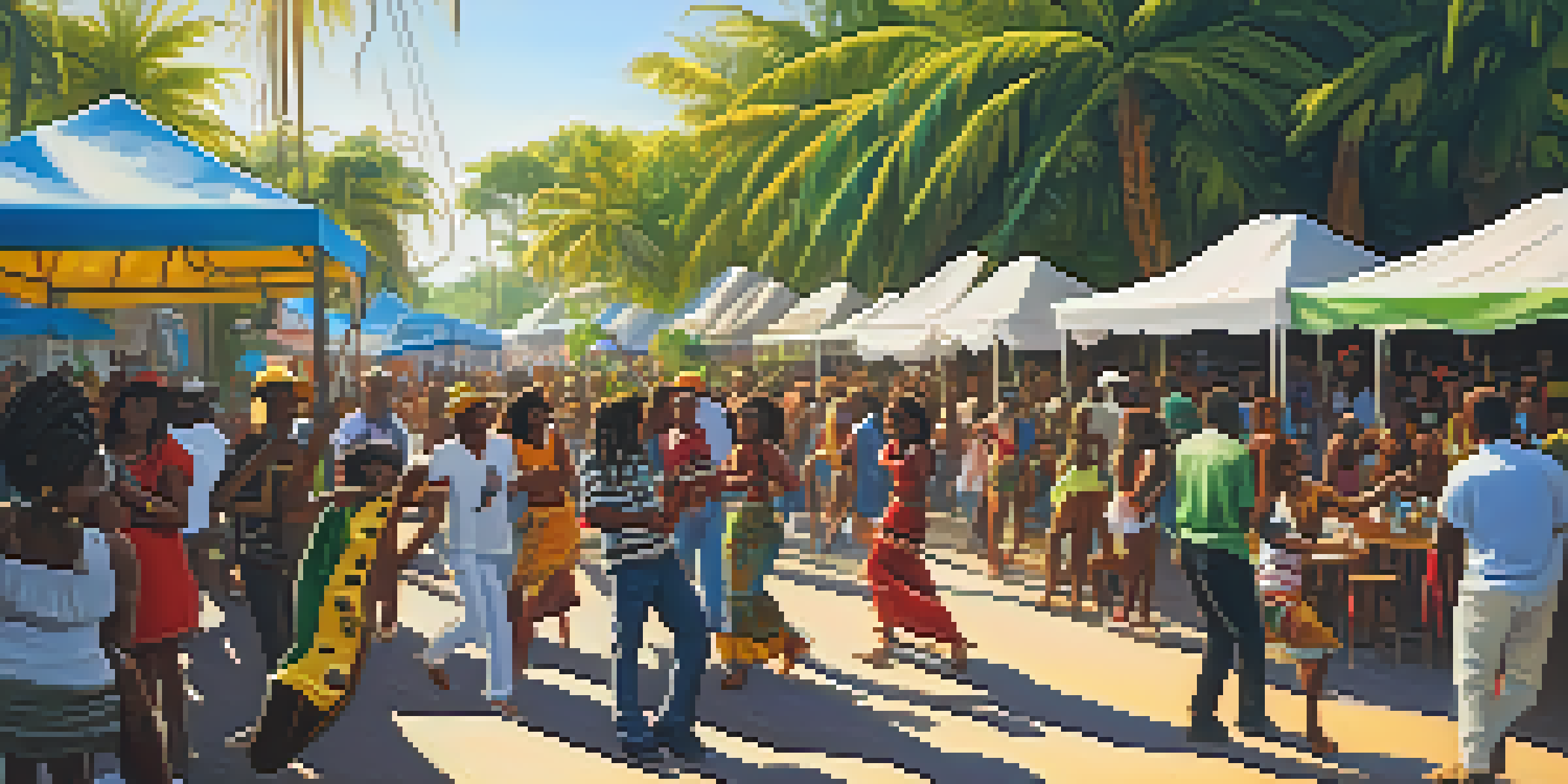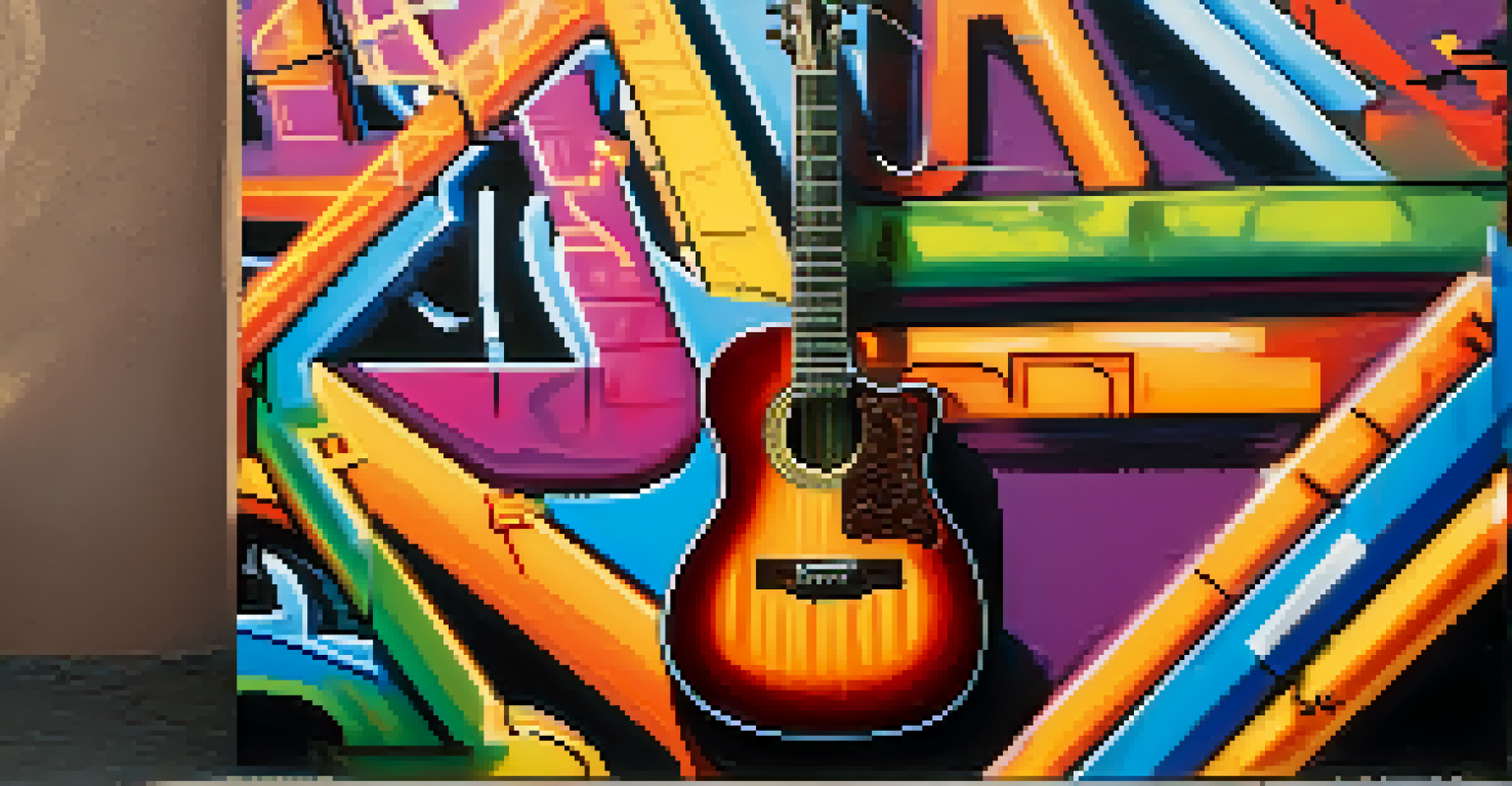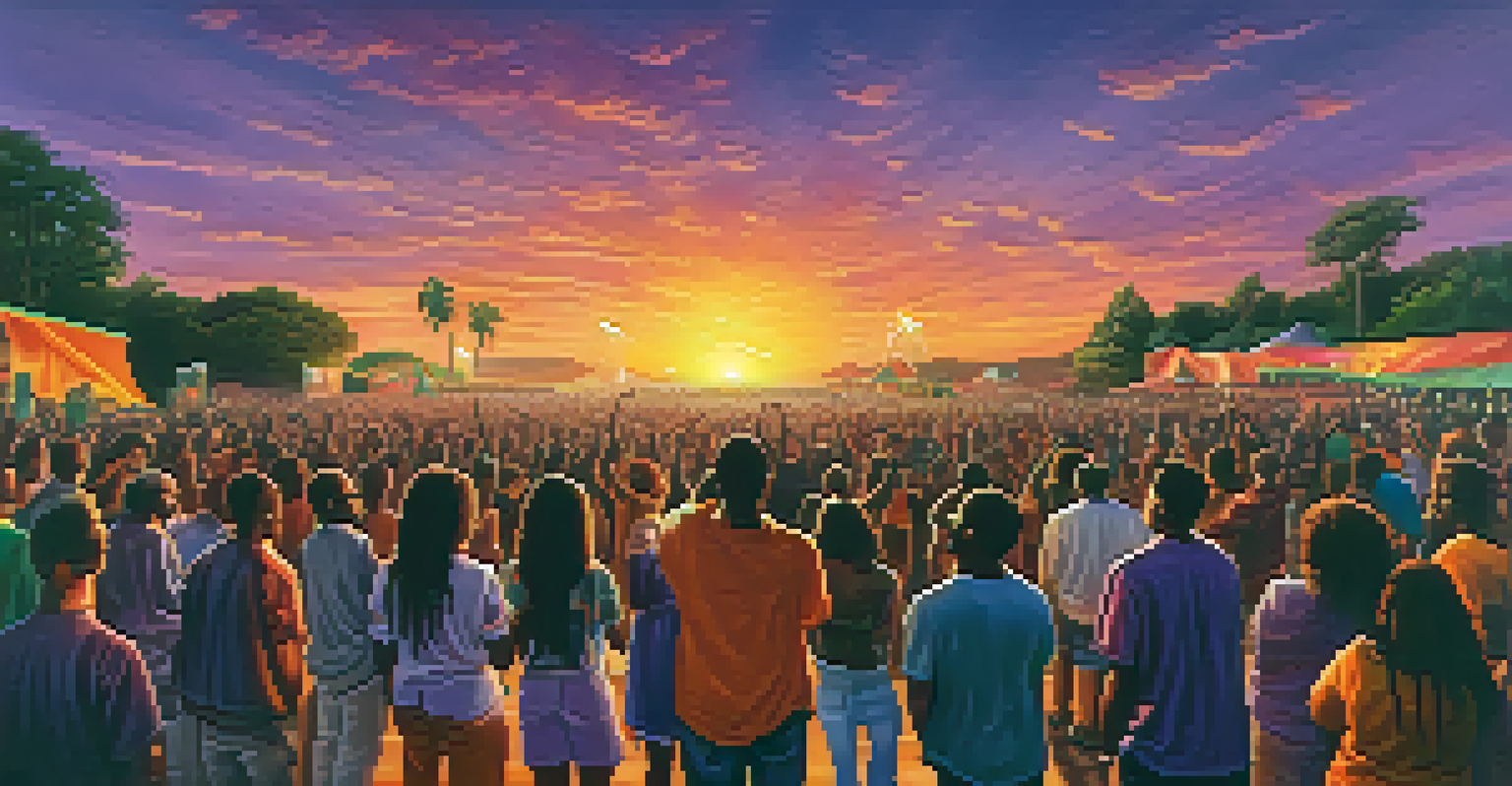Reggae Guitar and Its Influence on Social Justice

The Roots of Reggae: A Historical Overview
Reggae music emerged in the late 1960s in Jamaica, deeply rooted in the island's rich musical heritage. Combining influences from ska, rocksteady, and African rhythms, reggae quickly became a powerful medium for expression. It wasn't just about the sound; it became a voice for the marginalized, addressing social, political, and economic issues.
One good thing about music, when it hits you, you feel no pain.
As reggae evolved, it became synonymous with social justice, often reflecting the struggles of the Jamaican people. Artists like Bob Marley and Peter Tosh used their music to highlight the injustices faced by their communities. The guitar, with its distinctive offbeat strumming pattern, played a crucial role in conveying these messages, making the sound as impactful as the lyrics.
Through its catchy melodies and poignant lyrics, reggae music fostered a sense of unity and activism. The guitar not only created a captivating sound but also served as a tool for storytelling, allowing artists to share their experiences and advocate for change.
The Guitar's Unique Role in Reggae Music
In reggae, the guitar often takes center stage, providing the rhythmic backbone that defines the genre. The signature 'skank' rhythm—characterized by short, staccato chords on the offbeats—creates an infectious groove that invites listeners to engage. This unique style not only makes reggae danceable but also emphasizes the messages being conveyed.

Guitarists like Al Anderson and Junior Marvin have shaped the sound of reggae through their innovative playing techniques. Their ability to blend rhythm and melody allows the guitar to communicate emotions that words alone might struggle to express. This interplay between guitar and vocals enriches the storytelling aspect of reggae, making social issues more relatable.
Reggae's Roots in Social Justice
Reggae music originated in Jamaica, serving as a powerful voice for marginalized communities and addressing social, political, and economic issues.
Moreover, the guitar's versatility in reggae allows it to adapt to various themes, from love and unity to resistance and empowerment. It serves as a bridge between the artist and the audience, inviting listeners to reflect on their own experiences while dancing to the infectious rhythm.
Bob Marley: The Icon of Reggae and Activism
Bob Marley is perhaps the most iconic figure in reggae music, renowned for his ability to blend catchy melodies with profound social commentary. His songs, such as 'Get Up, Stand Up' and 'One Love,' resonate with themes of resistance and hope. Through his powerful guitar riffs and heartfelt lyrics, Marley became a symbol of the fight for social justice.
In the abundance of water, a fool is thirsty.
Marley's music often addressed issues like poverty, inequality, and political oppression, making him a voice for the voiceless. His passionate performances and charismatic presence brought attention to these critical issues, inspiring generations to advocate for change. The guitar, in Marley's hands, was not just an instrument; it was a weapon against injustice.
Even today, Marley's legacy continues to influence activists and musicians alike. His message of love and unity transcends borders, reminding us that the fight for social justice is universal. The enduring power of his guitar work serves as a testament to the role of music in inspiring social movements.
Social Justice Themes in Reggae Lyrics
Reggae lyrics often serve as a mirror reflecting societal issues, with many songs tackling themes of inequality, racism, and human rights. Artists use their platforms to raise awareness, encouraging listeners to question the status quo and take action. This lyrical content makes reggae music more than just entertainment; it becomes a call to action.
For instance, songs like 'Equal Rights' by Peter Tosh boldly demand justice and equality for all. The repeated refrain of seeking equal rights resonates with listeners, emphasizing the urgency of the message. Such lyrics inspire individuals to reflect on their own beliefs and actions, fostering a sense of responsibility towards social change.
Guitar's Role in Reggae's Message
The guitar's distinctive offbeat strumming and rhythmic backbone play a crucial role in conveying the emotional depth and storytelling aspect of reggae music.
Through storytelling and personal narratives, reggae musicians connect with their audience on a deeper level. This emotional resonance amplifies the impact of their messages, making the struggle for social justice not just a cause, but a shared experience.
Global Influence of Reggae on Activism
Reggae's impact extends far beyond Jamaica; it has inspired social justice movements worldwide. From the streets of Brazil to the protests in the United States, reggae music serves as a soundtrack for change. The genre's themes of empowerment and resilience resonate universally, encouraging activists to unite against oppression.
Artists from various countries have embraced reggae's sound, infusing it with local issues and cultural nuances. This fusion creates a rich tapestry of music that speaks to a wide range of social justice concerns. For example, reggae-influenced genres like dancehall and reggaeton continue to address contemporary issues, keeping the spirit of activism alive.
The global reggae community often comes together for concerts and festivals that promote social change. Events like Reggae on the River not only celebrate the music but also raise funds for various social causes. Through these platforms, reggae continues to inspire collective action and solidarity among diverse communities.
The Continuing Legacy of Reggae Guitar
As reggae music evolves, so does the role of the guitar within it. New generations of musicians are experimenting with the sound, blending reggae with genres like hip-hop, rock, and electronic music. Despite these changes, the guitar remains a vital instrument that carries forward the messages of social justice.
Modern artists like Protoje and Koffee are redefining reggae while addressing contemporary issues such as climate change, gender equality, and mental health. Their use of the guitar continues to evoke the same emotions and messages that the genre has always championed. This adaptability ensures that reggae remains relevant in today's social landscape.
Global Impact of Reggae Music
Reggae has inspired social justice movements worldwide, uniting diverse communities through its themes of empowerment and resilience.
The guitar's melodic and rhythmic qualities allow it to connect with audiences across generations. As long as there are stories to tell and injustices to address, the reggae guitar will continue to be a powerful tool for change.
Conclusion: The Power of Reggae Music and Its Guitar
In conclusion, reggae guitar is much more than a musical element; it is a vehicle for social justice. Through its unique sound and compelling lyrics, reggae has the power to inspire, unite, and provoke thought among listeners. The genre's rich history is intertwined with the fight for equality and human rights, making it a vital part of cultural activism.
As we reflect on the influence of reggae, we recognize that its messages remain relevant in today's world. The guitar continues to play a crucial role in transmitting these messages, reminding us of the importance of music in social movements. Each strum and chord carries the weight of history and the hope for a better future.

Ultimately, reggae guitar serves as a reminder that music can be a powerful force for change, transcending borders and connecting us all. As long as there are voices that demand justice, reggae will remain a beacon of hope and resilience.